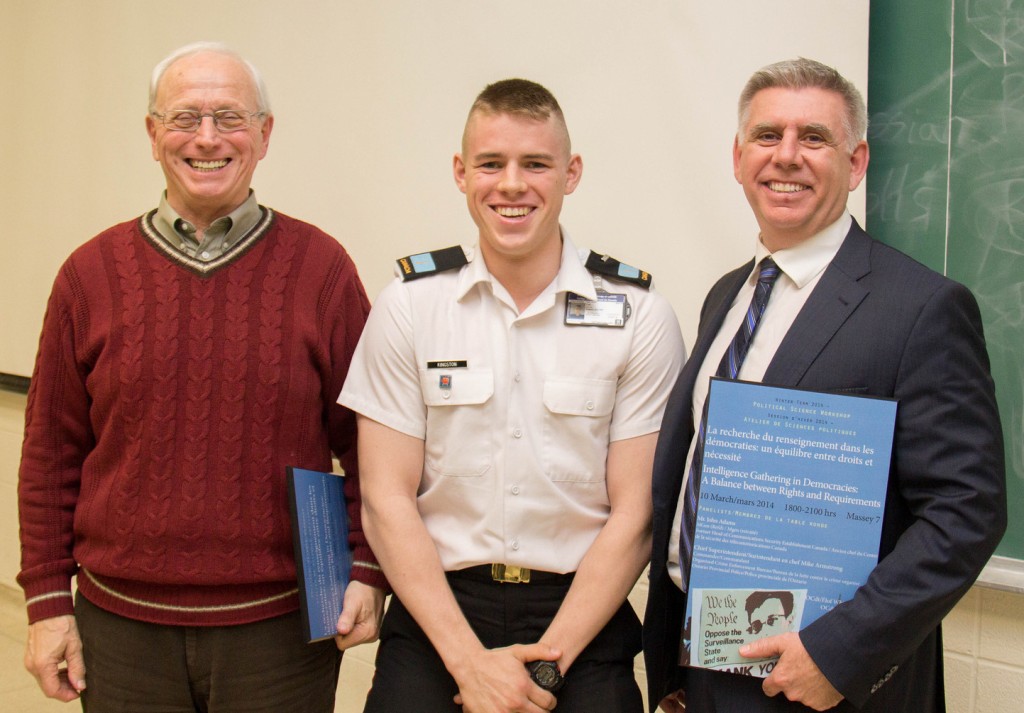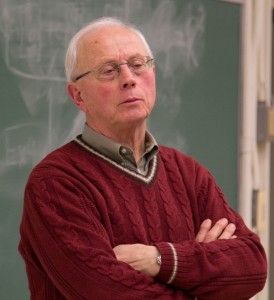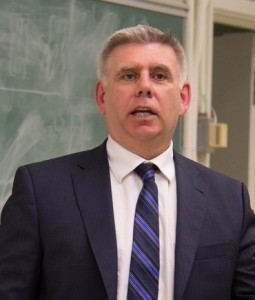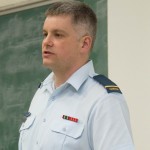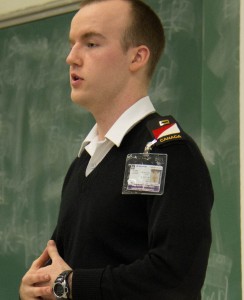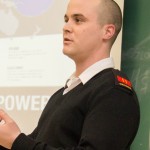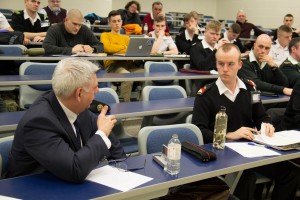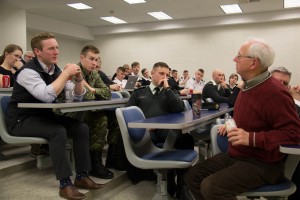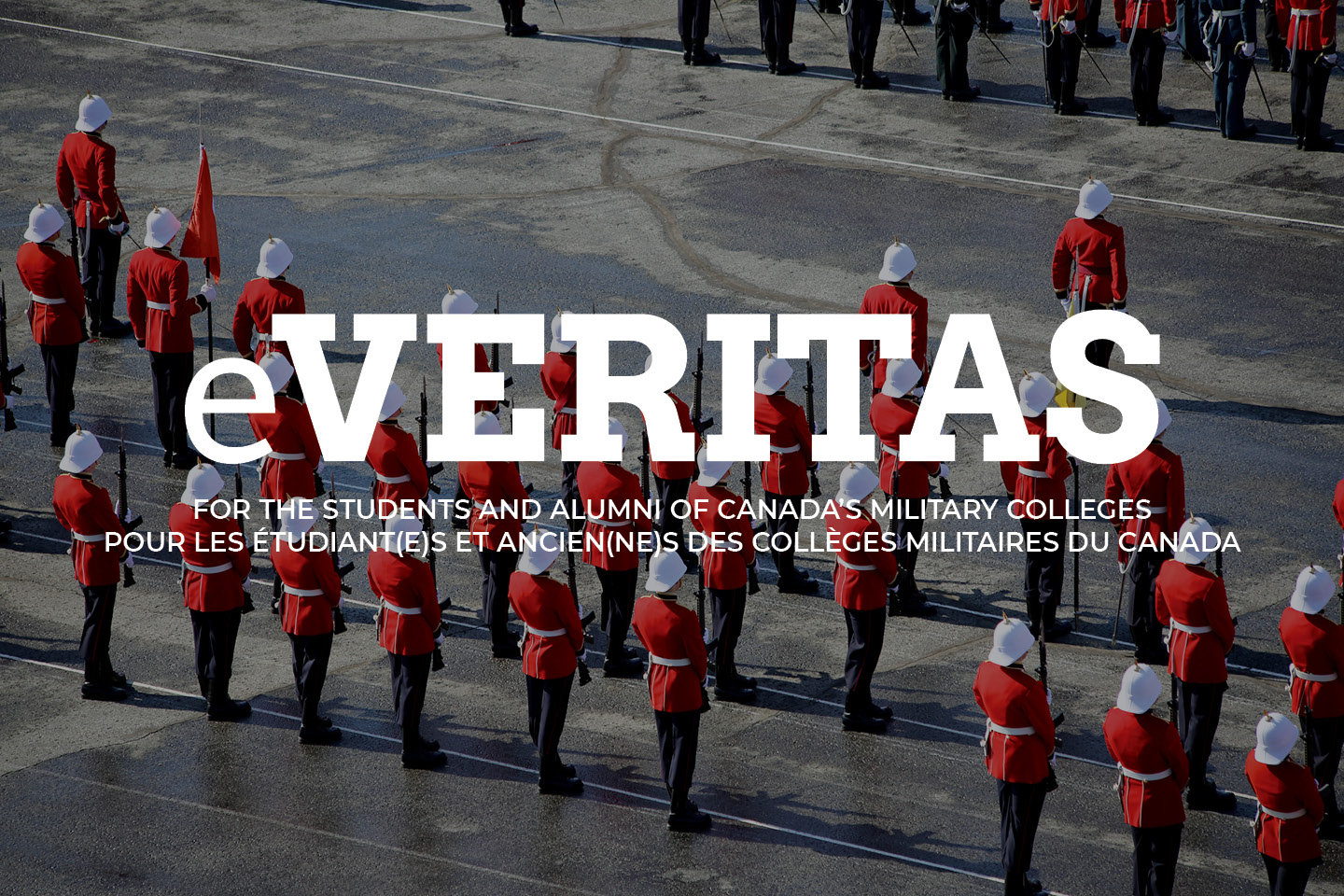
Caption: OCdt (I) Year Kingston on behalf of the organizers from the Department of Political Science workshop presented the two keynote presenters with souvenir posters from the event held March 10th, 2014. (All photos by Curtis Maynard – Click on each photo for better viewing)
RMCC Holds Unique Workshop on the Challenges of Security in an Open Society
Article by: H. Christian Breede and Anthony Seboyer
On March 10th 2014, the Department of Political Science at the Royal Military College of Canada held its second in an on-going series of workshops that address security issues facing Canada. Last week’s event explored the issue of intelligence gathering in democracies such as Canada and the question of how the rights and freedoms of Canadians can be protected without threatening those rights and freedoms in the process of that protection. The workshop created a venue for students to submit their research for scrutiny from not only their peers and faculty at the Royal Military College of Canada, but also from a distinguished group of special guests to include the former chief of the Communications Security Establishment Canada along with a Chief Superintendent with the Ontario Provincial Police. For the students presenting their research, this was a unique opportunity to gain feedback not only in the form of academic expertise, but also feedback based on a wealth of practical security and policing experience as represented by the two guest speakers.
The symposium was divided into two parts. During the first part, two distinguished guests presented their perspective on the issue of intelligence gathering in an open society. First to present was 6508 John Adams, (RMC Class of ’65) former chief of Communications Security Establishment Canada (CSEC) and he was followed by Mike Armstrong, a Chief Superintendent with the Ontario Provincial Police and commander of the Organized Crime Enforcement Bureau (OCEB). Together, these two erudite professionals presented first the foreign (in the case of CSEC) challenges of intelligence gathering and then the domestic (in the case of OCEB) challenges of intelligence gathering. Their work effectively set the stage for the second part of the symposium which was composed of the presentation of three student papers that addressed a range of specific topics within the broad symposium topic.
Recent events, from the Chelsea Manning leaks of diplomatic cables and reports to the Edward Snowden revelations of the breadth of and depth of electronic surveillance, necessitate the need to explore the challenges of gathering intelligence in democratic states. Democracies are thought of as bastions of rights and freedoms, where private and public spheres are kept separate. However, these features of the classic open society create vulnerabilities that demand attention. How does one address these vulnerabilities without destroying the very features of the open society that have been so hard-won?
OCdt Scotty Marshall led off with a detailed and nuanced exploration of the regulatory policies under which CSIS operates, concluding that the recent removal of the Inspector General’s role in regulating the activities of CSIS has not jeopardized the accountability of that organization. It has simply streamlined and made more efficient existing accountability practices within CSIS and cabinet in general.
Following OCdt Marshall, OCdt Nicholas Huxter presented a historical comparative account which contrasted the recent Snowden and Manning leaks and the public perceptions of those leaks with similar leaks that occurred in the 1960s and 1970s in the United States.
Finally, OCdt Matthew White-Crépeau presented a structural account of seeing to explain why certain middle powers have more robust foreign intelligence capabilities than others. Specifically, OCdt White-Crépeau argued that geography and the proximity to threats has an influence in the depth and breadth of foreign intelligence capabilities. His findings suggest that this explanation goes some to explaining why Australia has a rather robust capability while Canada does not.
The symposium was well attended, with close to fifty undergraduate and graduate students as well as faculty from a variety of departments from within RMCC in attendance. The debate following the presentations of the papers was informative and challenging to all sides. As the evening proceeded, participants in the symposium learned that the question of rights and freedoms, on the one hand, and the need for security, on the other, is indeed a balance and need not come at the expense of the other. Security is required for all to enjoy the freedoms of democracy, but they must be carefully balanced to ensure that our own laws are not sacrificed in the pursuit of improved security for our country. That these questions were being discussed in an open and candid forum, attracting experts from the field, is testament to the relevance of the social science research being conducted at the Royal Military College of Canada today.


